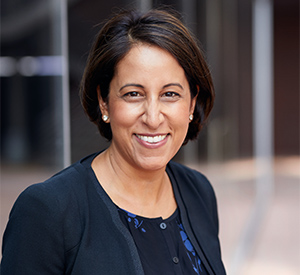Justice, Equity, Diversity and Inclusivity: A Q&A with Shalini Sharma
2020 was punctuated by profoundly sad and disturbing news stories that highlighted the stark racial disparity and injustice that still exists in our world. Yet, while these things that happened were true tragedies, they had a positive impact. They held a mirror up to our society and made many come face-to-face with some of the inequity that exists both in America and globally.
Individuals and organizations around the world are rallying for change. For some, recent events sparked new initiatives. For others, these events were an affirmation that they need to continue their efforts to create systemic change.
The data center industry was no exception.
Many data center operators are working aggressively, both as organizations and collectively as a sector, to take steps towards a more inclusive, equitable and diverse industry. To learn more about the positive changes within the data center industry, we recently sat down with Shalini Sharma, senior vice president, general counsel, at Vantage Data Centers.
As someone with more than 22 years of legal experience and a passion for mentoring early career and diverse attorneys, Shalini has a true understanding of the challenges that diverse people face when entering the workforce. Today, she is using that knowledge to spearhead initiatives that will not only help drive diversity but also ensure that diverse employees are set up for success at Vantage.
Interview with Shalini Sharma

Senior Vice President, General Counsel
Data Centers Today (DCT): 2020 has certainly been a wake-up call in the areas of social justice and inclusivity. What kinds of diversity and inclusivity initiatives are you seeing being introduced in the data center industry as a result?
Shalini Sharma: These have been extraordinarily challenging times, and from my perspective, also extraordinarily enlightening times. Many of these issues have existed for generations, but they surfaced again in plain sight for everyone to see over the last couple of years. In response to the Black Lives Matter and MeToo movements, many companies have stepped up and developed a social conscience. And the data center industry is certainly included in that group.
As employers, we have an opportunity and a responsibility to establish and uphold strong corporate values and be good corporate citizens. That being said, as employers, this can be tricky. We don’t want to get involved in the personal lives of our employees, but we do want – and need – to create an environment where employees feel comfortable and supported coming to work every day as their authentic selves.
Today, the data center industry is playing a critical role in society. We enable essential digital services and solutions by building the data centers that house the servers that make these digital services available to people so that they can connect virtually despite the global pandemic.
Within our industry, there is a real push for what we at Vantage call “JEDI principles,” which stands for Justice, Equity, Diversity and Inclusivity. And what is unique in our industry is that we’re not just upholding these values, we’re developing the infrastructure that allows for greater connection and understanding among all of us at a time when we need it most.
DCT: What steps is Vantage taking to make JEDI a part of the company and its culture moving forward?
Shalini Sharma: We’ve worked intentionally to create a framework within which to thread these principles. A lot of this involves adjustments to our human resources practices, working hand-in-hand with the HR team to ensure that we are making every effort to hire with an eye towards both finding the best talent and finding diverse talent.
In addition, we will be establishing a mentorship program to ensure that our employees are successful in their roles within the company. We want everyone to have equal footing and the tools necessary to not just do their jobs but also to excel and advance within the organization.
And, while we’re looking to provide resources and ingrain these principles within our own organization, we’re also looking for ways to collaborate in these efforts with our vendors and customers. This is an important topic in our industry, and we’ve already had clients reach out to connect on these important issues.
On the vendor side, we’re engaging our vendors to learn about what they’re doing in this space. This is everyone’s responsibility and if we’re going to make impactful change within our industry, we need to ensure that we’re partnering with vendors who are also supporting these same principles.
DCT: What kind of goals and milestones has the company established for the program? What kind of data can the company use to gauge its success in these initiatives?
Shalini Sharma: Not only does there need to be accountability, but there needs to be metrics. We’ve worked internally to identify what metrics and measurements we can use to ensure we’re making progress towards embracing our JEDI principles.
In very broad terms, we’re looking at targets as far as hiring practices – measuring where we are today and establishing where we want to be. We’re also looking at more focused hiring and understanding who goes through our hiring process. This will help us to better understand who is successful in the hiring process, why they are successful and also why people leave the company.
In addition, we’re embracing new ways to generate data, such as tweaking our employee engagement surveys to address diversity and inclusivity principles. Survey results will help us identify the level of engagement among employees, learn what employees are thinking about, and understand their opinions about what they feel is working and where they feel there is room for improvement. Every voice matters at Vantage.
Finally, we’re developing ways to assess and measure how our vendors and suppliers support similar initiatives.
DCT: You seem, personally, to be very invested in these JEDI principles and diversity initiatives. What, in your career and experience, makes this such an important area of focus for you?
Shalini Sharma: When I first started working professionally, I just assumed that everyone was working on a level playing field. I later recognized that juggling things like family life and perceptions based on stereotypes would result in some employees having more advantages to succeed in the office than others. It was something that I personally experienced, having to make a conscious effort to work harder to be treated equitably as both a woman of color and a working mother.
I didn’t have many role models early in my career. This helped me to realize the importance of mentorship and sponsorship. We all need allies inside and outside of the office. Anyone who can mentor someone should do so. Mentorship can truly make a difference and help individuals avoid taking missteps in their careers. Sponsorship requires more investment, but it’s not only an investment in an individual, it’s also an investment in the company.
As my career progressed, I became more active in identifying mentors, and – as I advanced – I made a point of paying it forward and mentoring and sponsoring others. And while people were coming to me for guidance, I was also learning from them, especially young people who grew up in different times and circumstances than I did.
I love working with and talking to young people. It’s a great way to hear what’s important to the next generation of the workforce and provides insight into how a company can successfully navigate harnessing future talent.
I’ve personally used the lessons that I experienced from my mentees to make the organizations that I’m a part of more equitable, just, inclusive and diverse. We all benefit from this. Organizations perform better, not just from a bottom-line perspective, but from an employee culture, engagement and sentiment perspective, when there are more diverse perspectives at the table.
I’m excited to be able to play a role in amplifying these needed perspectives both at Vantage and in the broader data center industry.
To learn more about Shalini’s experience and the initiatives that she’s driving at Vantage, be sure to read her recent interview in InterGlobix Magazine.



